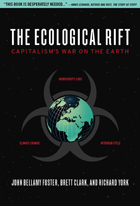environment
Essential guide for green left activists
Derek Wall discusses the crisis in the financial system, wall is an activist in Green Left, an ecosocialist current in the Green Party of England and Wales. Filmed at the Coalition of Resistance (http://www.coalitionofresistance.org.uk) conference November 27, 2010.
The Rise of the Green Left: Inside the Worldwide Ecosocialist Movement
By Derek Wall
Pluto Press, 190 pages, paperback
Review by Mat Ward
`Leave the oil in the soil!' -- Oil curses, climate conferences and fake Norwegian ‘Good Samaritans’

A humpback whale at the Bluff Whaling Station, South Durban, in 1909. From "Facts About Durban".
By Patrick Bond
November 23, 2010 -- Links International Journal of Socialist Renewal -- The stench of rotting blubber would hang for days over The Bluff in South Durban, South Africa, thanks to Norwegian immigrants whose harpooning skills helped stock the town with cooking fat, margarine and soap, starting about a century ago. The fumes became unbearable, and a local uproar soon compelled the Norwegians to move the whale processing factory from within Africa’s largest port to a less-populated site a few kilometres southeast.
There, on The Bluff’s glorious Indian Ocean beachfront, the white working-class residents of Marine Drive (perhaps including those in the apartment where I now live) also complained bitterly about the odour from flensing, whereby blubber, meat and bone were separated at the world’s largest onshore whaling station.
Britain: Understanding the Green Party

November 2, 2010 -- New Left Project -- Derek Wall is an economics lecturer and writer. He has been a member of the Green Party since 1980 and was Green Party principal speaker from 2006 to 2007. He is a founder of the Ecosocialist International and Green Left [an organised ecosocialist group within the Green Party] and has written widely on green politics. His latest books are The Rise of the Green Left and The No-Nonsense Guide to Green Politics. In this interview, he and Edward Lewis examine the nature and politics of the Green Party from a left perspective.
* * *
What are the origins of the Green Party? What are the circumstances that brought it about?
Τζον Μπέλαμι Φόστερ: Μια οικολογική επανάσταση ενάντια στον καπιταλισμό
The Ecological Revolution, Making Peace with the Planet
John Bellamy Foster
Νέα Υόρκη: Monthly Review Press 2009
σελ. 328.
Του Σάιμον Μπάτλερ*
[Αγγλική εκδοχή σε http://links.org.au/node/1193.]
Video: `The Story of Electronics' -- Designed for the dump (from the makers of `The Story of Stuff')
November 10, 2010 -- From the makers of The Story of Stuff and the The Story of Cap and Trade, Annie Leonard presents the latest episode in the series, The Story of Electronics. Like the first film, Leonard simply explains in plain English how an economy based on endless production of commodities for profit's sake creates waste and pollution and poisons people and the planet. While she urges consumers to make wiser choices when they shop, she also points out that it is the nature of the present system of ownership and production, and its lack of adequate regulation, that has to be changed to really make a difference. You can download the annotated script of The Story of Electronics HERE.
`Productivism' or liberation? Socialists debate consumerism

By
Ben Courtice, Melbourne
November 2, 2010 -- In a recent seminar on trade unions and the climate movement, I observed a surprising disagreement between some of the socialists present. It was started by a comment from Melbourne University academic (and Socialist Alliance activist) Hans Baer, who suggested that the “treadmill of production and consumption” had to be challenged, that we need to challenge consumerism and the alienation of work that makes people buy things to feel better.
Liz Ross of Socialist Alternative took umbrage at this, declaring that workers should create and enjoy wonderful technological products, tearing down a straw figure that Hans was supposedly arguing to stultify the creativity of the working class.
Turning the tide of oil in US and world politics

By Dan La Botz

October 20, 2010 -- Links International Journal of Socialist Renewal, with the permission of Monthly Review Press, is excited to offer its readers an excerpt from the The Ecological Rift: Capitalism’s War on the Earth, an important new book by John Bellamy Foster, Brett Clark and Richard York. Links' readers are urged to purchase the book. Please click here to order your copy. You can download (in PDF) the chapter, "The ecology of consumption", below the following introduction, or read it on screen.
* * *
The limits to energy efficiency under capitalism

By Simon Butler
October 9, 2010 -- Green Left Weekly -- It is close to an article of faith among environmentalists that using less energy is a big part of the solution to climate change. Energy efficiency is often said to be the “low hanging fruit” of climate policy. On face value, the benefits seem obvious.
The knowledge needed to make big gains in efficiency already exists. Using less energy will save consumers and industry money, whereas other policies will be costly. And most importantly, lower energy use could make a big dent in global greenhouse gas emissions.
The UN Intergovernmental Panel on Climate Change and the International Energy Agency both promote energy efficiency as an important climate measure.
However, strong evidence has emerged that new energy efficient technologies alone won’t do much to cut emissions. Indeed, in a capitalist economy, it’s very likely that energy efficiency gains will lead to higher energy use, not less.
Disaster management: New Zealand, Haiti and the ‘Cuban way’

Earthquake damage in Christchurch.